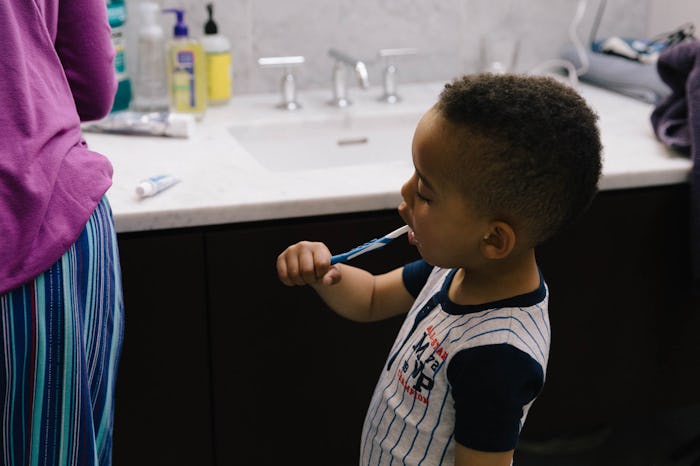Life
What Your Dentist Wants You To Know About Your Child's First Visit
Just getting your toddler to brush their teeth can be a challenge, but taking them to the dentist for the first time can seem even more daunting. A little bit of preparation can make all the difference, so keeping what your dentist wants you to know about your child’s first visit in mind is step one in being ready. (Step two? Get some caffeine.)
Romper spoke with pediatric dentist Dr. Lorra Cantú Lindsey from AOMS Pediatric Dentistry in Amarillo, Texas, who says preparation for your child’s first dental visit should really start with their oral hygiene routine after their first tooth comes in. “Start with brushing the tooth for about 30 seconds twice a day, and then slowly transition to two minutes," Lindsey says.
To instill good oral hygiene habits, Lindsey also recommends praising your child on a job well done after brushing, and suggests making oral hygiene fun by letting your child pick out their own toothbrush and toothpaste and maybe even getting a little creative. “Create a game to play during brushing and flossing time, or create a chart that gives the children stickers after they brush their teeth for the whole two minutes.”
Once you have your brushing routine down, it’s time to schedule your first dental appointment, which Lindsey says should be six months after the first tooth grows in, followed by regular dental visits every six months after that. “It’s important to start children on a regular dental schedule early,” explains Lindsey. "This sets them up for optimal dental health and helps prevent dental anxiety.”
When you get to the dentist’s office, Lindsey notes that it’s a good rule of thumb to arrive a little early so you have time to fill out any needed paperwork. She suggests bringing along any medical or dental insurance information, including a list of your child’s allergies. “At the first visit at our pediatric dental practice, we always like to discuss the child's detailed medical history and drug allergies,” says Lindsey. "We then address any dental concerns the parents may have prior to the exam.”
Depending on your child’s age, your dentist may need to get specific X-rays. When the exam is done, they will likely go on to educate you about proper oral hygiene, specifically flossing and brushing at least twice a day and using fluoride toothpaste. She says that over usage of sippy cups or bottles, and constant snacking of high carb foods can lead to interproximal tooth decay, so depending on your child’s case, your dentist may suggest dietary changes or additional fluoride if needed.
What if your child is totally terrified about going to the dentist? Lindsey says she encourages parents to be calm, positive, and enthusiastic regarding their child's dental visit, because children can pick up on their parent's nervous vibes. To ease your child's anxiety, she says you can also use various children's books and television shows that depict expectations at the dentist's office, like the Berenstain Bears series. Lindsey says that dentists will often try to make a child's first visit fun and happy, with lots of positive reinforcement and a reward at the end. "Even if a visit does not go as smoothly as we would like, we continue to encourage and cheer the patient on, and a prize afterwards always puts a smile on their faces," she says.
Finding a pediatric dentist that is a good fit for you and your child, along with getting an early start on a good brushing routine, can make your child’s dental journey easier to chew on. The first visit may not be easy, but it's worth it.
